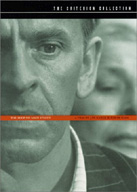The Shop on Main Street (Obchod na korze)
| Ever since the horrors of the Holocaust became widely known after the Allied liberation of the concentration camps, one of its most persistent and nagging qualities has been its resistance to representation. After all, how could an event so horrific, so tragic, so monumentally overwhelming possibly be contained within the limits of an historical or artistic representation? It is, by its very nature, uncontainable and unrepresentable, although important cinematic artists have tried through various means, from Alain Resnais' abstract documentary Night and Fog (1945), to Steven Spielberg's Hollywood epic Schindler's List (1993), to Claude Lanzmann's nine-hour survivor documentary Shoah (1985). Unlike those filmmakers, when Ján Kadár and Elmar Klos made The Shop on Main Street (Obchod na korze) in 1965, they did not even attempt to approach the Holocaust as an event, but rather focused on how it affected two memorable characters. It's a simple, but starkly effective approach, and it suggests the sheer impossibility of ever knowing the Holocaust while simultaneously reassuring us that we can always know individual human beings and how their lives intersect with larger historical forces. In essence, The Shop on Main Street is about the moral dilemma that was faced by millions during World War II—those normal, fundamentally decent everymen and -women who made a terrible choice by turning their heads while the Jews and others were rounded up and taken away. It is a truly existential dilemma, one that we may perhaps never be able to comprehend fully without having been there ourselves, faced with the choice of ignoring the unignorable or risking our own lives. What makes The Shop on Main Street so memorable is its evocation of both the tragic and the comic in its story, freely mixing humor and horror in a way that is as life-affirming as it is thought-provoking. In its simple tale situated in a Slovak village held by the Nazis in 1942, it stirs the soul as much as it touches the heart, reminding us that even the worst situations have a human face on them. Based on a story by Ladislav Grosman, it focuses on the character of Tony Brtko (Jozef Kroner), an amiable, but listless and unsuccessful carpenter who is constantly nagged by his wife and lives under the shadow of his aggressive brother-in-law who has achieved a position of authority within the Nazi party. Much of the film turns on Tony's relationship with Rozalie Lautmann (Ida Kaminska), an almost child-like, elderly Jewish woman who is slightly deaf and senile. When the Nazis took control of the village in which Tony lives, they quickly separated out the Jews and took away their places of business, putting "Aryan controllers" in charge. Because his brother-in-law is a Nazi, Tony finds himself put into forced control of Mrs. Lautmann's small shop that sells buttons and sewing materials. Tony takes the position because he thinks it will get him money and social standing, but he quickly finds that the shop has almost no inventory and makes no money. Mrs. Lautmann survives only because the Jewish community takes care of her. In her enfeebled position, she is wholly unaware that there is war going on or that Tony has been put into control of her store. Rather, she thinks he is a new assistant, and some of the film's funniest moments come from the irony of this situation. Although many of Tony's friends are either Jewish or sympathetic to the Jews, he is politically apathetic. He does not like the fascist invaders who have taken control of his village, and he is particularly bitter toward his brother-in-law. Yet, as the film makes clear, this apathy is one of the crucial conditions that enabled the Nazis to perpetrate the Holocaust. Thus, Tony becomes a conflicted figure in the film. On the surface, he is a simple and likable man, not too smart and certainly not overly ambitious. Yet, in the grander scheme, he is morally bankrupt, cowardly and selfish even when he tries to do the right thing. The Shop on Main Street moves from the comic moments of the early passages into a steadily escalating climate of fear, as the intentions of the Nazi occupants become all too clear, visually paralleled by an enormous, pyramid-like monument being constructed in the town square to honor them. One gets the feeling that, once that monument is complete, terrible things will happen. And, as we know they will, terrible things do happen, and Tony finds himself explicitly faced with a choice: Hide Mrs. Lautmann and risk his own life, or give her up to the Nazis and survive. The last quarter of the film takes place entirely within the store and focuses on this dilemma. One of the film's most gut-wrenching moments is when Mrs. Lautmann finally deciphers what is going on after she sees all the Jews rounded up in the village square and being loaded onto trucks. It is a heartbreaking sequence in which her only defense mechanism—her innocent naiveté—is suddenly and violently shattered. Kadár and Klos bring the film to a devastating conclusion that is then tempered with a final dream sequence that some have seen as being a cop-out after the horrors that have taken place. Yet, we can forgive them this one moment of fantastical optimism in the face of the greatest human tragedy of the 20th century because it shows that they still have faith in humankind. Even in the worst moments, there is still a sense of hope that life will go on, which is all some people have to hold onto.
Copyright © 2001 James Kendrick | |||||||||||||||||||||||||||||||||||||||||||||||
Overall Rating: 


 (4)
(4)


